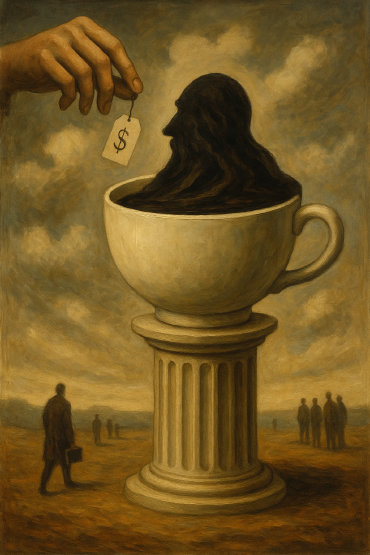Coffee, Between Illusion and Authenticity: A Mirror of Modern Consumer Culture
Cultural Significance of Coffee
For modern people, coffee is no longer just a simple beverage. It has become a cultural symbol and a mirror reflecting daily life and society. Just a few decades ago, coffee represented a simple ritual after breakfast or a brief break with colleagues at work, but now that single cup reveals personal taste, quality of life, and even social status and values. However, at the same time, this cup of coffee also contains numerous illusions and shadows.
Changes in Consumer Culture
This article examines how coffee has become the center of consumer culture, the illusions formed in the process, and the social issues arising from them. Through a critical perspective on these phenomena, we aim to explore the direction we should take moving forward.
The relationship between coffee and brands
Modern marketing places greater importance on the image that a product symbolizes rather than its intrinsic value. A prime example of this is Starbucks. This brand goes beyond just selling coffee it sells 'style and sensibility' and has established itself as a global lifestyle brand.
Coffee as a Symbol
Starbucks showcases 'special moments' through celebrities, allowing consumers to project themselves onto these images, fostering a sense of belonging and satisfaction. Coffee is no longer just a matter of taste and aroma it has become an important social marker of which brand I associate with. This instills in consumers the belief that 'I am special for choosing this brand,' transforming consumption into a means of self-expression.
The Truth About Price Illusion
The price of high-end coffee is increasingly rising. Specialty coffee, which exceeds 5,000 won per cup, has become a part of daily life rather than just a luxury for special occasions. However, these high prices do not necessarily reflect quality. Rather, the brand's reputation and marketing strategies often drive the prices.
Price as a Psychological Symbol
In such situations, price operates beyond a mere medium of exchange, functioning as a psychological symbol. The act of drinking an expensive coffee is not just about consuming caffeine it becomes a means of expressing the identity of 'I am someone who can make such choices.' Ultimately, we are consuming an illusion that symbolizes something beyond the essence of coffee itself.
The Trap of Consumer Psychology
Today, a cup of coffee has become a tool to express 'me.' What coffee I drink, where I drink it, and which brand I choose have become a language that conveys my tastes and position. The problem is that these choices are not derived from internal needs, but rather determined by socially injected images.
Loss of Authenticity in Consumption
In this process, consumption gradually loses its authenticity and focuses on external impressions and packaging. We are led by an incessant desire for better and more expensive things, pursuing social recognition and a differentiated image rather than our true needs. This culture ultimately results in trapping oneself in an illusion.
Social Costs and Inequality
Coffee consumption culture extends beyond individual preferences and influences social structures. The normalization of expensive coffee acts as a psychological and economic burden on relatively low-income groups, and the polarization of consumption and competition based on illusions deepens social inequality. The reality that even a cup of coffee creates hierarchies based on 'who, where, and how it is consumed' is a bitter aspect.
Side effects of consumer culture
Furthermore, a brand-centric consumer culture induces continuous consumption stimuli and reinforces an environment where 'desire' takes precedence over 'need.' Ultimately, this creates a market where image and packaging are prioritized over the essence of the product, causing consumers to be swayed more by external factors rather than making autonomous choices.
The True Value of Coffee
So what kind of coffee should we drink? True coffee lies not in its brand or price but in the essence and value it contains. Good coffee comes from high-quality beans and can positively impact our lives through ethical production, fair trade, and harmony with the environment.
Consumer's own questions
Consumers also need to place their own tastes and values at the center and ask themselves, 'What kind of coffee do I need?' This goes beyond a simple beverage choice and becomes an act that reflects one’s attitude toward life and values. True satisfaction comes not from the images in advertisements, but from the deep flavor of a cup of coffee and the meaning it carries.
Consumption Oriented Beyond Illusion
It is now necessary for us to look beyond what is visible. Sustainable consumption, fair trade, and connection with local communities will become the new standards that coffee culture should aim for in the future. This change depends on the direction consumers choose and also calls for greater social responsibility from businesses.
Transition to meaningful consumption
Consumption is not just a matter of individual preferences it has the power to shape the values of society as a whole. In this era, what we choose to support in terms of values is becoming more important than what we consume.
The meaning of a cup of coffee
Coffee remains a small comfort and vitality that we need in our lives. However, that comfort must contain true value rather than being an illusion for us to reflect on the direction of our lives through it. Instead of being swayed by a brand's image, we need consumption that considers quality, ethics, and sustainability.
Conclusion: The Starting Point of Change
I hope that today's cup of coffee becomes a starting point that goes beyond a simple daily routine, allowing for self-reflection and contributing to making society a little better. Remember that true satisfaction comes not from external evaluations, but from inner authenticity and depth.

Post a Comment